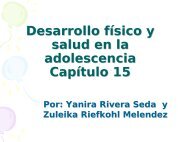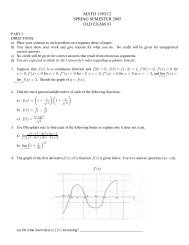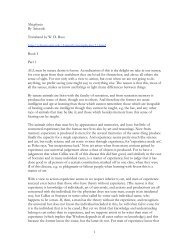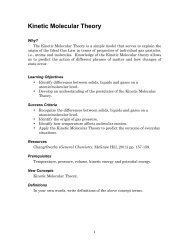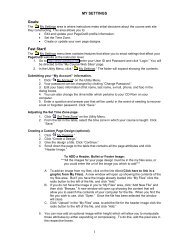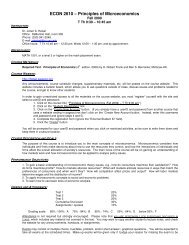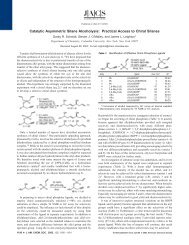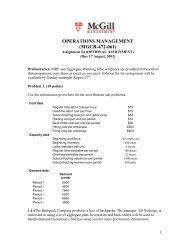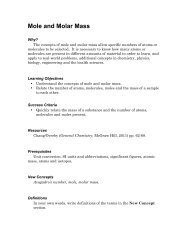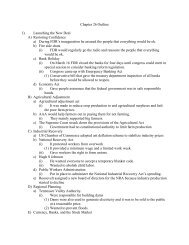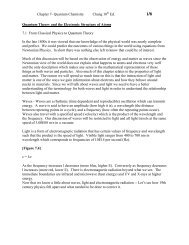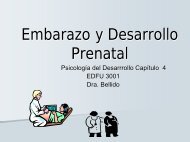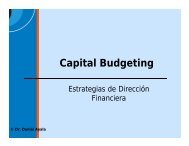Create successful ePaper yourself
Turn your PDF publications into a flip-book with our unique Google optimized e-Paper software.
<strong>EDWARD</strong> J. <strong>O=BOYLE</strong>DePaul UniversityDegree: B.A. in Economics (1960)Minor: Political ScienceHonors: Pi Gamma MuEDUCATIONSaint Louis UniversityDegree: M.A. in Economics (1964)Minor: Political ScienceThesis: “A History and Analysis of Provisions Governing the Duration of Benefits UnderState Unemployment Insurance Laws”Degree: Ph.D. in Economics (1972)Minor: Political ScienceThesis: “Proposed Criteria of Achievement for Institutional Training Under the ManpowerDevelopment and Training Act”Honors: Graduate Fellowship (1960-1964)WORK EXPERIENCEAssociate Professor of Economics (1977-present)College of Administration and BusinessLouisiana Tech UniversityTeaches the customary full-time schedule of courses in the Department of Economics andFinance: two three-hour courses in two quarters and one three-hour course in the other quarter. Thesecourses include most often Economics 201 (macro) and 215 (principles for nonbusiness students), lessfrequently Economics 202 (micro), and occasionally Economics 406 (comparative systems). During atypical 9-month academic year, teaches approximately 450 students or 1350 semester credit hours. Servesas a reader on dissertations and theses (directed three dissertations in economics when that doctoraldegree was viable). In spring 1991 taught for seven weeks at the Poznan School of Management in Polandsupported by an academic specialist grant from the U.S. Information Agency. In fall 1997 taught for threemonths at the National University of Ireland-Galway. In summer 1999 taught an intensive two-weekcourse in personalist economics at the University of Verona, and repeated that offering in summer 2000,2001, and 2002.Initiates and conducts scholarly research consistent with his professional interests and concernsfor presentation at various regional, national, and international meetings and for publication in assortedprofessional referred journals. An inventory of those interests and concerns follows. Much of thisscholarly work falls within the domain of social economics and increasingly is leading to book-lengthmanuscripts such as THE SOCIAL ECONOMICS OF HUMAN MATERIAL NEED published in 1994by Southern Illinois University Press, SOCIAL ECONOMICS: PREMISES, FINDINGS, ANDPOLICIES published by Routledge in 1996, PERSONALIST ECONOMICS: MORAL CONVICTIONS,ECONOMIC REALITIES, AND SOCIAL ACTION published by Kluwer Academic Publishers in 1998,and TEACHING THE SOCIAL ECONOMICS WAY OF THINKING, published by the Edwin MellenPress in 1999.1
Project Director (1974-1976)Ohio Health Manpower Linkage System ProjectOhio Department of HealthServed as project director of the Ohio Health Manpower Linkage System Project. Supervised astaff of five health manpower research specialists working for a twenty-five member advisory grouprepresenting health interests in Ohio. The project recommended constructive steps toward a decisionmakingprocess capable of generating broad health manpower policy consistent with the State's healthneeds. It also identified and assembled data and documents needed for performing health manpowerresearch and planning.Senior Research Associate (1972-1974)Center for Human Resource ResearchOhio State UniversityShared responsibility with another research associate for adult women's cohort in NationalLongitudinal Surveys. Helped code and edit data from 1971 and 1972 surveys. Reviewed computer tapeprepared by Census Bureau so that errors could be corrected before tapes were released for analyticalpurposes. Assisted in preparation of documentation and indexes that improved access to data file. Helpeddesign telephone questionnaire that was administered in 1974.Labor Economist (1967-1970)Bureau of Labor StatisticsIn consultation with senior staff of Census Bureau prepared supplementary questions for CPS.Assisted in coding and editing responses to questions and in designing tabulation specifications. Analyzeddata and wrote reports for Monthly Labor Review. Evaluated drafts of research under contract to LaborDepartment and reviewed portions of President's Manpower Report.Research Analyst (1964-1967)Illinois State Employment ServiceCompiled and interpreted labor force data for reports covering Illinois counties in St. Louis area.Wrote newsletter on local labor market developments for general public. Prepared reports on availabilityof workers and prevailing wages in selected occupations. Conducted surveys to determine need fortraining and reported on progress of persons enrolled in training. Made surveys of persons registered forwork. Assisted in preparation of a 1967 skill survey of St. Louis SMSA.PRIMARY RESEARCH INTERESTSHuman Material Need. One aspect of human material need is the need for income that is sufficient forphysical well-being or, simply, physical need. My research has centered mainly on questions of thedefinition and measurement of economic sufficiency, poverty, and homelessness and how poverty relatesto family dysfunction. Additionally, my research has addressed the economic hardship of unemploymentin the context of the several effects of unemployment and the controversy of absolute poverty versusrelative poverty. The nature of research on physical need is unavoidably normative. The challenge to theresearcher is to make it less arbitrary. The other aspect of human material need is the need for work as ameans of personal development. Seen from this perspective, work is more than producing a given good orservice. It is an opportunity to be creative and to belong and thereby to realize more fully one's ownpotential as a person. Heightened workplace obligations and wider participation in workplace decisionmakingare two means of fulfilling this side of human material need.2
Several years ago I published an article that argues for replacing the homo economicus of mainstreameconomics with homo socio-economicus from social economics (see “Homo Socio-Economicus:Foundational to Social Economics and the Social Economy”). An on-line search of the HarvardUniversity book collection using “human material need” as a keyword uncovers only one book -- mySOCIAL ECONOMICS OF HUMAN MATERIAL NEED -- indicating that this is a new domain ofresearch which is beginning to win scholarly recognition and legitimacy. Similarly, an online search ofthe same collection using “personalist economics” as a keyword uncovers only one book -- myPERSONALIST ECONOMICS: MORAL CONVICTIONS, ECONOMIC REALITIES, AND SOCIALACTION. See also “On Need, Wants, Resources, and Limits,” “Subsidiarity and Human Material Need:The Caring Hand in Place of the Invisible Hand,” and “Personalist Economics: Unorthodox and Counter-Cultural.”The Workplace: Organizing Principles, Underlying Social Values, and Justice. Three organizingprinciples -- competition, intervention, and cooperation -- govern the workplace, each one reflecting aspecific social value. Competition is built upon individual freedom, intervention rests on equality, andcooperation is an extension of community. In turn, each of the three social values is foundationallysupported by one of the three principles of justice: equivalence, distributive justice, and contributivejustice. An efficient, orderly, and tranquil workplace depends on a proper integration of all threeorganizing principles along with their associated social values and principles of justice. Dysfunctionoccurs when the delicate balance among the three sets is upended. My research began more than 30 yearsago with questions of employment security and (re-)training. More recently it has extended toimprovements in productivity and quality and to marketplace innovation. At the intra-firm level, I haveprepared reports on productivity- and quality-improvement at companies in Louisiana that apply suchmethods as statistical process control, just-in-time manufacturing, cell manufacturing, gain sharing,ESOP, team safety awards, focused factories, quality circles, and total quality management. In almostevery instance, one finds a stronger emphasis on cooperation and teamwork (i.e., community). I haveobserved that quality at the source drives productivity and that quality is promoted importantly byenlarging the scope of responsibility of the individual worker. Greater responsibility contributes to theworker's need for work itself and improved productivity and quality, in turn, make for a more competitivefirm. I have noticed that the need of the worker and the need of the employer encompass questions ofethics because, finally, responsibility is a matter of what is owed by one person to others. Most recently Ihave been successful in publishing these observations in the professional literature (see “The EthicalDimensions of Quality and Productivity Improvement” and “The Industrial Commons and OtherWorkplace Regimes”).Supra-Firm Alliances and Inter-Firm Partnerships. Most workplace problems in a market economy aremanaged at the intra-firm level. Problems that do not yield to individual action and that are commonacross firms are handled from time to time through private-group agreement. Those agreements may becollusive and zero-sum propositions or cooperative and positive-sum arrangements. My research interestsare directed toward the latter type as manifested in the workplace. I have visited St. Louis PRIDE, forexample, which is a supra-firm alliance for addressing problems in the construction industry. PRIDE'sMemorandum of Understanding sets forth the obligations of the individual members to one another. Ihave interviewed the senior management of Acadian Ambulance in Lafayette which has built an interfirmpartnership to provide emergency medical care to residents of an area that otherwise likely would beunderserved. I have observed first hand the operations of LOOP in New Orleans which is a supra-firmalliance established to help reduce the hazards in handling crude oil notably in the offloading ofsupertankers and the storage of the oil prior to shipment to the refinery. My observations in these areashave been published most recently in the professional literature (see “Inter-Firm and Supra-Firm3
Cooperation in the Workplace and the Marketplace”). Future research will be directed toward uncoveringadditional cases of cooperative and positive-sum arrangements, probing their origins, characteristics, andeffects in order to understand better how they differ from collusive and zero-sum arrangements.Innovation. Innovation is at the very core of economic development. For that reason, learning more aboutinnovation is instructive on activating economic development and thereby is germane to the problem ofunmet human material need. From a Schumpeterian perspective, it is the entrepreneur who drives themarket economy. Thus, learning more about economic development inevitably means learning moreabout the entrepreneur. Between 1988 and 1997 I had a unique opportunity to examine and preparereports on the process of innovation at all of the Louisiana companies that have been designated finalistsfor the U.S. Senate Innovation Award. These visits have brought me in direct contact with the seniormanagers who have been responsible for new products and services that have achieved some marketplacesuccess. An article on the person and the work of the entrepreneur that is based on these visits has beenpublished in the professional literature (see “On the Person and the Work of the Entrepreneur”). Anotherarticle which asserts that economic insecurity for individuals and families has intensified of late in partbecause the pace of entrepreneurship has increased has been published (see “Productivity, Profitability,and Economic Insecurity”). Additionally I have prepared a book-length manuscript LOUISIANAWORKS! that derives from these visits and the visits to the finalist companies for the U.S. SenateProductivity Award and that I hope someday will be published in hardcover form.Business Ethics. In 1986 I developed a new pedagogy for teaching business ethics to undergraduatestudents. That experience triggered an interest in company, professional, and trade association codes ofethics. Over the past several years, I have studied in some detail the code of ethics of the AmericanMarketing Association (see “The American Marketing Association Code of Ethics: Instructions forMarketers”), the Direct Selling Association (see “Ethical Issues in Sales: A Direct-Selling Perspective”),the Association for Computing Machinery, the American Association of Advertising Agencies,Association for Incentive Marketing, and the Outdoor Advertising Association. My central interest inevery instance has been to understand more fully what these codes encompass, how the codes originated,and the extent to which they embody or reflect certain principles of ethics. An article that demonstratesthe linkages between the most recently adopted code of ethics of the American Marketing Associationand cognitive moral development has been published (see “Applying the American MarketingAssociation's Ethical Code Within a Cognitive Moral Development Model”). My interest in the problemof teaching ethics to persons already engaged in professional work has led to the development of userfriendlyprograms written in GW-BASIC for members of the American Marketing Association (seeDECISION.AMA) and for members of the Association for Computing Machinery (see “An EthicalDecision-Making Model for Computing Professionals”). My work in ethics and economics, along withAmy Chua’s and Amartya Sen’s, is cited approvingly in Italian at the official website of the Diocese ofVerona, see www.diocesiverona.it/cnt/cmm/cmm_page.asp?DDocumento=5146.PUBLICATIONS“Work Experience of the Population,@ Monthly Labor Review, January 1968 (with Forrest A. Bogan).“Work Plans of Men Not in the Labor Force,” Monthly Labor Review, August and September 1968(with Vera C. Perrella).“Employment of High School Graduates and Dropouts,” Monthly Labor Review, December 1968.“Job Tenure: How It Relates to Race and Age,” Monthly Labor Review, September 1969.“America's Less Fortunate: The Long-Duration Unemployed,” Monthly Labor Review, April 1970.“The Problem of Evaluating Institutional Training Under the Manpower Development and Training Act,”4
Review of Social Economy, April 1974.Health Manpower Planning Literature: A Review of Selected Journals, Ohio Department of Health,June 1976 (with Russell E. Boyce and Robert P. Brockman).Ohio Health Facilities and the Services They Render: Sources of Information, Ohio Department ofHealth, August 1976 (with Russell E. Boyce).Health Manpower Supply and Demand: Sources of Information, Ohio Department of Health, September1976 (with Russell E. Boyce).Data Collected on Health Professionals Licensed by the State of Ohio: A Detailed Alphabetical Index,Ohio Department of Health, September 1976.Health Manpower Planning in Ohio: Some Suggestions for a Research Agenda, Ohio Department ofHealth, September 1976.“On Evaluating the Health Care Delivery System,” Forum for Social Economics, Spring 1978.“On Caring and the Restoration of Social Order,” Review of Social Economy, October 1978.“Private Non-farm Wage and Salary Employment in Louisiana: 1971-1976,” The Louisiana Economy,November 1978.“Infant Mortality in Louisiana: Some Comments on its Incidence and Cost,” The Louisiana Economy,February 1979.“Inflation: A Moral and Economic Erosive,” The Louisiana Economy, August 1979 (with Henry C.Mayer).“Productivity in Louisiana Manufacturing, 1967-1977: A Note,” The Louisiana Economy, February 1980(see also under Press Releases).“Cost-Effective Clinical Decision Making,” Pediatrics, February 1980.“Work Experience and Unemployment in Louisiana in 1975,” The Louisiana Economy, November 1980(see also under Professional Presentations).Data for Louisiana from the 1980 Census: Summary Tape File 1-A Technical Document, Louisiana TechUniversity, March 1981.“Louisiana: Red, White, Black, Brown, and Yellow,” The Louisiana Economy, May 1981 (see also underPress Releases).“Incorporated Places in Louisiana: Hostile Camps or Healthy Communities?,” The Louisiana Economy,August 1981 (see also under Press Releases).“Net Migration in Louisiana, 1970-1980: An Application of Four Hypotheses,” The Louisiana Economy,November 1981.“On Attitudes Toward Death and the Cost of Dying,” The Linacre Quarterly, February 1982.“On the University Researcher as an Entrepreneur,” International Journal of Social Economics, Volume11, Number 3/4, 1984 (see also under Professional Presentations).“University Research and Knowledge as an End in Itself: Entrepreneurship in the Academic Order,”ITEST Bulletin, September-November 1985, reprinted in the newsletter of the Science,Technology, and Society Association (UK), Autumn 1986“On Reconstructing the Foundations of Policy Toward the Unemployed,” Review of Social Economy,December 1985.“Economics: A Moral Science Because Persons Matter More Than Things,” International Journal ofSocial Economics, Volume 13, Number 10, 1986 (see also under Professional Presentations).An Evaluation of the Rehabilitation Training Program at Louisiana Center for the Blind: Final Report,Louisiana Tech University, June 1986 (see related item under Grants/Contracts).“Economic Self-Sufficiency: Defined and Measured in Relation to Economic Poverty,” Forum for SocialEconomics, Fall 1987 (see also under Professional Presentations).5
Soliciting Applications and Selecting the Winner: A Handbook of Basic Procedures, U.S. SenateProductivity Board, State of Louisiana, and Louisiana Tech University, May 1989, revised June1990.Poland's Solidarity Movement: Some Likely Sources of Information, Louisiana Tech University,September 1989.“Ethical Issues in Sales: A Direct-Selling Perspective,” Business Insights, Volume 9, Number 2, 1990(with Lyndon E. Dawson).“Poverty: A Concept That Is Both Absolute and Relative Because Human Beings Are At OnceIndividual and Social,” Review of Social Economy, Spring 1990.“On the Need for Work as Such,” International Journal of Social Economics, Volume 17, Number 4,1990 (see also under Professional Presentations).“Homelessness: A Critical Aspect of Unmet Physical Need,” Forum for Social Economics, Spring 1990(see also under Invitations).“Helping Students of Marketing Deal with Ethics: A New Pedagogy,” Marketing Education Review,Winter 1991 (with Lyndon E. Dawson).“On Justice and Charity,” Review of Social Economy, Winter 1991.“Reply to Arnold McKee,” Review of Social Economy, Fall 1992.“Inter-Firm and Supra-Firm Cooperation in the Workplace and the Marketplace,” International Journal ofSocial Economics, Volume 19, Numbers 10/11/12, 1992 (see also under ProfessionalPresentations).“The American Marketing Association Code of Ethics: Instructions for Marketers,” Journal of BusinessEthics, December 1992 (with Lyndon E. Dawson).“Work Habits and Customer Service in Post-Communist Poland,” International Journal of SocialEconomics, Volume 20, Number 1,1993.“Challenges Facing Social Economists in the Twenty-First Century: A Catholic's Perspective,” Review ofSocial Economy, Winter 1993.“Subsidiarity and Human Material Need: The Caring Hand in Place of the Invisible Hand,” Providence:Studies in Western Civilization, Volume 2, Number 2, Winter 1993.“On Need, Wants, Resources, and Limits,” International Journal of Social Economics, Volume 20,Number 12, 1993.“The Ethical Dimensions of Quality and Productivity Improvement,” Forum for Social Economics,Spring 1994 (see also under Professional Presentations).“Homo Socio-Economicus: Foundational to Social Economics and the Social Economy, Review of SocialEconomy,” Fall 1994 (see also under Professional Presentations).“The Industrial Commons and Other Workplace Regimes,” International Journal of Social Economics,Volume 21, Number 8, 1994 (see also under Professional Presentations).“On the Person and the Work of the Entrepreneur,” Review of Social Economy, Winter 1994.“On the Hospital as Commons,” International Journal of Social Economics, Volume 22, Number 7, 1995(with Meade P. O=Boyle, M.D.; see also under Professional Presentations and under InternetPublications).“Applying the American Marketing Association's Ethical Code Within a Cognitive Moral DevelopmentModel,” Quarterly Journal of Ideology (with Lyndon E. Dawson and Richard Tansey), Volume19, Number 1/2, 1996.“Productivity, Profitability, and Economic Insecurity,” International Journal of Social Economics,Volume 24, Issue 4, 1997 (see also under Professional Presentations).“Transitions Into and Out of Poverty,” International Journal of Social Economics, Volume 25, Number 9,1998 (see also under Professional Presentations).“Centering Economic Affairs on Justice and the Person: A Vision for the European Union,” International6
Journal of Social Economics, Volume 27, Number 2, 2000.“Salary Compression and Inversion in the University Workplace,” International Journal of SocialEconomics, Volume 28, Numbers 10/11/12, 2001(see also under Professional Presentations).“Remembering Joseph M. Becker, S.J.,” Forum for Social Economics, Fall 2001.“Personalist Economics: Unorthodox and Counter-Cultural,” Review of Social Economy, December 2001(see also under Professional Presentations).“Contributions of German and American Jesuits in Economics: The Last 100 Years,” Forum for SocialEconomics, Spring 2002 (see also under Professional Presentations).“An Ethical Decision-Making Process for Computing Professionals,” Ethics and Information Technology,Volume 4, Number 4, 2002.“Norms for Evaluating Economic Globalization,” International Journal of Social Economics (withGiuseppe Gaburro), Volume 30, Number 1/2, 2003 (see also under Professional Presentations).“Income Gap Between Poor Families and Others: Sign of Individual Freedom or Proof of SocialInequality?,” Forum for Social Economics, Spring 2003.“Comments on the Foundations of Economic Personalism Series,” Journal of Markets and Morality,Volume 6, Number 2, Fall 2003 (see also under Professional Presentations).“Getting the Hard-Core Premises of Economics Right,” Logos: A Journal of Catholic Thought andCulture, Volume 7, Number 1, Winter 2004.“Principles of Economic Justice: Marketplace and Workplace Applications,” Forum for SocialEconomics, Volume 34, Number 1 and 2, Fall 2004, Spring 2005.“Classical Economics and the Great Irish Famine: A Study in Limits,” Forum for Social Economics,Volume 35, Number 2, 2006.PROFESSIONAL PRESENTATIONSChairman and discussant, Ethical Issues in Evaluating the Health Care Delivery System, Association forSocial Economics in conjunction with Allied Social Science Associations National Convention,Dallas, December 1975.Discussant, Justice and Liberation, Association for Social Economics in conjunction with Allied SocialScience Associations National Convention, New York, December 1977.Author, “Norms of Approval for Educational Programs in the Health Professions,” Missouri ValleyEconomic Association Annual Conference, Kansas City, February 1978.Author, “The Problem of Evaluating Educational Programs for Health Professionals,” LouisianaConference of Colleges and Universities, Grambling State University, March 1978.Author, “On the Allocation of Health Services: Two Contending Philosophies,” Midwest EconomicsAssociation Annual Meeting, Chicago, April 1978.Author, “On Caring and the Creation and Maintenance of Economic Community,” Association for SocialEconomics in conjunction with Eastern Economic Association Annual Convention, Washington,April 1978.Author, “The Economic Hardship of Unemployment,” Association for Social Economics in conjunctionwith Western Economic Association Annual Conference, Hawaii, June 1978.Discussant, Ethics in Economics, Association for Social Economics in conjunction with WesternEconomic Association Annual Conference, Hawaii, June 1978.Author, “Evaluating the Delivery of Health Care Services,” Association for Social Economics inconjunction with Allied Social Science Associations National Convention, Chicago, August1978.Author, “Selected Aspects of the Economics of Heinrich Pesch: A Presentation,” History of EconomicsSociety Annual Meeting, Harvard University, April 1980.7
Author, “Work Experience and Unemployment in Louisiana in 1975: Evidence from the 1976 Survey ofIncome and Education,” Academy of Louisiana Economists Annual Conference, Louisiana StateUniversity, October 1980 (see also under Publications).Author, “Solidarity: Rejecting the East While Not Embracing the West,” Third World Congress of SocialEconomics, California State University-Fresno, August 1983.Author, “Toward a Comprehensive Policy for the Unemployed: Norms, Criteria, FoundationalPrinciples, and Theories,” Third World Congress of Social Economics, California StateUniversity-Fresno, August 1983 (see also under Publications).Author, “On the University Researcher as an Entrepreneur,” Third World Congress of Social Economics,California State University-Fresno, August 1983 (see also under Publications).Discussant, Social Control of Health Economics, Third World Congress of Social Economics, CaliforniaState University-Fresno, August 1983.Author, “Economics as a Moral Science: An Argument Based on Three Complementary Definitions ofthe Science,” Academy of Louisiana Economists Annual Conference, Grambling StateUniversity, October 1984 (see also under Publications).Discussant, Morality of Capitalism: U.S. Economic and Social Policy, Association for Social Economicsin conjunction with Allied Social Science Associations National Convention, Dallas, December1984.Author, “On Defining and Measuring Economic Self-Sufficiency,” Annual Meeting of the SouthwesternFederation of Administrative Disciplines (SWFAD), New Orleans, March 1985 (see also underPublications).Author, “Cooperation at the Supra-Firm Level: A Survey of Recent U.S. Experience,” MidwestEconomics Association Annual Meeting, Cincinnati, March 1985.Author, “Cooperation at the Supra-Firm Level: Illustrations,” Association for Social Economics inconjunction with Allied Social Science Associations National Convention, New Orleans,December 1986.Discussant, Social Economic Policy: Community in Enterprise, Association for Social Economics inconjunction with Allied Social Science Associations National Convention, New Orleans,December 1986.Author, “On Teaching Principles of Economics Using the Concept of ‘The Limit’,” SouthwesternEconomics Association Annual Conference, Dallas, March 1987.Discussant, Economics of Education II, Midwest Economics Association Annual Meeting, St. Louis,March 1987.Discussant, Values and Institutional Development, Association for Social Economics in conjunction withAllied Social Science Associations National Convention, Chicago, December 1987.Author, “On the Definition of Poverty: Some Critical Comments,” Midwest Economics AssociationAnnual Meeting, Chicago, April 1988.Author, “On Instructing Students of Marketing in Business Ethics: Some Pedagogical Suggestions,”Academy of Marketing Science Annual Conference, April 1988.Author, “Quality, Productivity, and Company Ethics,” Association for Social Economics in conjunctionwith Allied Social Science Associations National Convention, New York, December 1988 (seealso under Publications).Author, “On the Need for Work as Such,” Association for Social Economics in conjunction with theAllied Social Science Associations National Convention, Atlanta, December 1989.Chairman, The Unemployed as Human Beings in Need: A Symposium on the Works of Joseph M. Becker,S.J., Association for Social Economics in conjunction with the Allied Social Science AssociationsNational Convention, Atlanta, December 1989.8
Author, “Catholic Social Economics: A Response to the Economic Disorder of the Modern Age,”Midsouth Academy of Economics and Finance, Jackson, February 1990.Author, “The Catholic Church and the Post-Communist Reconstruction of Poland,” Midsouth Academyof Economics and Finance, Shreveport-Bossier City, February 1991.Author, “The Workplace: An Expanding Industrial Commons,” Midwest Economics Association, St.Louis, April 1991 (see also under Publications).Author, “Human Physical Need: A Concept That At Once Is Absolute and Relative,” Sixth WorldCongress of Social Economics, Creighton University, August 1991 (abstract appears inproceedings; see also under Publications).Author, “Inter-Firm and Supra-Firm Cooperation in the Workplace and the Marketplace,” Sixth WorldCongress of Social Economics, Creighton University, August 1991 (abstract appears inproceedings; see also under Publications).Author, “Catholic Social Economics: A Response to Certain Problems, Errors, and Abuses of the ModernAge,” Sixth World Congress of Social Economics, Creighton University, August 1991 (abstractappears in proceedings; see also under Invitations).Author, “Homo Socio-Economicus: Foundation for a New Paradigm in Economics,” Association forSocial Economics in conjunction with the Allied Social Science Associations NationalConvention, Anaheim, January 1993 (see also under Publications).Author, “Telkom Teletra, A Major Polish State-Owned Manufacturer in Transition: First HandObservations,” Privatization and Socioeconomic Policy in Central and Eastern Europe: AnInternational Conference, Krakow (Poland), October 1993.Discussant, Communalism, Cooperation, Organized Labor and the Common Good, Association for SocialEconomics in conjunction with Allied Social Science Associations National Convention,Washington, January 1995.Author, “On the Hospital as a Commons,” Midwest Economics Association, Cincinnati, March-April1995 (see also under Publications).Author, “Productivity, Profitability, and Economic Insecurity,” Association for Social Economics inconjunction with the Allied Social Science Associations National Convention, San Francisco,January 1996 (see also under Publications).Author, “Transitions Into and Out of Poverty,” Eighth World Congress of Social Economics, The Collegeof Charleston, July-August 1996 (see also under Publications).Discussant, Catholic Perspective(s) of Poverty, Eighth World Congress of Social Economics, The Collegeof Charleston, July-August 1996.Discussant, Social Economics: A Catholic Perspective, Eighth World Congress of Social Economics, TheCollege of Charleston, July-August 1996.Discussant, Public Issues in the Social Economy, Association for Social Economics in conjunction withthe Allied Social Science Associations National Convention, New Orleans, January 1997.Author, “The Obligations of Marketers Under Justice to the Poor,” Midwest Economics Association,Kansas City, March 1997 (see also under Publications as “The Duty of the Firm in Selling to thePoor: A Question of Person, Justice, and Subsidiarity”).Author, “A Commentary on John Paul II's Vision of the Social Economy,” Southwest Social SciencesAnnual Conference, New Orleans, March 1997 (see also under Internet Publications).Author, “The Person Behind the Principles,” Ninth World Congress of Social Economics, DePaulUniversity, July 1998.Author, “Toward an Improved Definition of Poverty,” Association for Social Economics in conjunctionwith the Allied Social Science Associations National Convention, New York, January 1999 (seealso under Invited Articles).Discussant, Defining Poverty in the United States, Association for Social Economics in conjunction with9
the Allied Social Science Associations National Convention, New York, January 1999.Author, “Salary Compression and Inversion: Age Discrimination in the University Workplace,”Association for Social Economics in conjunction with the Allied Social Science AssociationsNational Convention, Boston, January 2000.Author, “Contributions of German and American Jesuits to Economics: The Last 100 Years,” TenthWorld Congress of Social Economics, Emmanuel College, Cambridge University (UK), August6-9, 2000.Author, “Making Room in the Celtic Tiger for Traditional Irish Values,” Association for SocialEconomics in conjunction with the Allied Social Science Associations National Convention, NewOrleans, January 2001 (see also under Internet Publications).Author, “Personalist Economics: Unorthodox and Counter-Cultural,” Presidential Address, Associationfor Social Economics, Allied Social Science Associations National Convention, New Orleans,January 2001 (see also under Publications). Translation into Italian in progress at the Universityof Verona.Chairman, Growth, Economic Development, and the Environment, Association for Social Economics inconjunction with the Allied Social Science Associations National Convention, Atlanta, January2002.Author, “Comments on the Center for Economic Personalism’s Three Monographs on the Synthesis ofChristian Personalism and the Free-Market Theory of Conventional Economics,” SecondNational Research Conference of the Lilly Fellows Program, Baylor University, November 2002(see also under Publications).Author, “Sustainability: A Personalist Economics Point of View,” Association for EvolutionaryEconomics and Association for Social Economics in conjunction with the Allied Social ScienceAssociations National Convention, Washington, January 2003.Presenter, “Socio-Economics, Communitarianism, and Heterodox Economics,” Association of AmericanLaw Schools, Washington, January 2003.Author, “Norms for Evaluating Economic Globalization,” ITEST Conference, Belleville (IL), September2003 (see also under Publications).Discussant, Culture and Empiricism, Association for Social Economics in conjunction with the AlliedSocial Science Associations National Convention, San Diego, January 2004.BOOKS/COLLECTED PAPERSEditor, “The Unemployed as Human Beings in Need: A Symposium on the Works of Joseph Becker,S.J.,” Forum for Social Economics, Spring 1991.Co-editor and contributor, THE SOCIAL ECONOMICS OF HUMAN MATERIAL NEED, with sixcontributors and co-edited with John B. Davis, Southern Illinois University Press, August 1994,ISBN 0-8093-1921-7, 221pp. Listed in welfare and poverty section of “Annotated Listing ofNew Books” in Journal of Economic Literature, June 1995, p. 931. Chapter Five by the author,“The Need for Work as Such: Self-Expression and Belonging,” was revised and reprinted in THECHANGING NATURE OF WORK, Island Press, 1998.Editor and contributor, SOCIAL ECONOMICS: PREMISES, FINDINGS, AND POLICIES. A collectionof essays prepared by thirteen prominent social economists, Routledge, March 1996, ISBN 0-415-13721-7, 224pp. Reviewed by Jürgen Backhaus in European Journal of the History ofEconomic Thought, Autumn 1997.Author, PERSONALIST ECONOMICS: MORAL CONVICTIONS, ECONOMIC REALITIES, ANDSOCIAL ACTION. Kluwer Academic Publishers; March 1998, ISBN 0-7923-8146-7, 229pp.10
Author, ECONOMIA PERSONALISTA: CONVINZIONI MORALI, REALTÀ ECONOMICHE EAZIONE SOCIALE, Padua, Italy: CEDAM (Casa Editrice Dott. Antonio Milani), 2001, ISBN88-13-22993-3, with introduction by Giuseppe Gaburro. Translation under the direction ofEdward J. O=Boyle by Chiara Coronin in fulfillment of the requirements for a degree ineconomics from the University of Verona.Editor, “John Paul II's Vision of the Social Economy,” International Journal of Social Economics,Volume 25, Number 11/12, 1998. A collection of seventeen essays by twenty-one socialeconomists, 240pp. Translated into Italian by Luisa Binotto under the direction of GiuseppeGaburro, University of Verona, International Journal of Social Economics, forthcoming.Editor and contributor, TEACHING THE SOCIAL ECONOMICS WAY OF THINKING. A selectedcollection of thirty-four papers from the Ninth World Congress of Social Economics, 1999, TheEdwin Mellen Press, ISBN 0-7734-7894-9, 711pp.Editor and contributor, “The Social Economics of Discrimination and Other Injustices.” A collection ofseventeen papers by twenty prominent social economists from the annual meetings of theAssociation for Social Economics in conjunction with the Allied Social Science AssociationsNationalConvention in Boston, January 2000, International Journal of Social Economics,Volume 28,Numbers 10/11/12, 2001.Editor, “The Best of the Review of Social Economy: 1944-1999,” Review of Social Economy, VolumeLXIII, Number 3, September 2005. A collection of 12 articles originally published in the Reviewbetween 1944 when publication began and 1999 and selected as the best published during thatperiod by a team of 17 selectors familiar with social economics, the Association for SocialEconomics, and the Review.VISITING PROFESSOR/SCHOLARPoznan School of Management, Poznan, Poland, April-May 1991.National University of Ireland-Galway, September-November 1997.Santa Clara University, May 1998.Center for Economic Personalism, Acton Institute, Grand Rapids, Michigan, June 2000.University of Verona, July 2002, July 2001, July 2000, July 1999.Abano Summer School on the social market economy, Abano Terme, Italy, August 2005.Garda Summer School on the social market economy, Verona, Italy, August-September 2006.INVITED ARTICLES“Spotlight on Louisiana,” Population Today, June 1985.“Catholic Social Economics: A Response to Certain Problems, Errors, and Abuses of the Modern Age,”SOCIAL ECONOMICS: RETROSPECT AND PROSPECT, Mark Lutz (editor), Kluwer-NijhofPublishers, 1990.“What Is ‘Market Justice’ Today?,” The New Catholic Miscellany, Charleston, SC, October 18, 1990.“A Home Is a Natural Right,” The New Catholic Miscellany, Charleston, SC, November 8, 1990.“Poverty: Absolute and Relative,” ENCYCLOPEDIA OF POLITICAL ECONOMY, Phillip O=Hara(editor), Routledge, 1998.“The Nature of Social Economics: A Personal Commentary,” International Journal of Social Economics,Volume 26, Number 1, 1999.“The Duty of the Firm in Selling to the Poor: A Question of Person, Justice, and Subsidiarity,” Forum forSocial Economics, Fall 1998 (see also under Professional Presentations as “The Obligations ofMarketers Under Justice to the Poor”).11
“Social Economics: Current State of Affairs,” THE CURRENT STATE OF ECONOMIC SCIENCE,Volume 5 (with Patrick J. Welch), Shri Bhagwan Dahiya (editor), Spellbound Publications, 1999.“Toward an Improved Definition of Poverty,” Review of Social Economy, September 1999 (see alsounder Professional Presentations).“Distribution Sensitive Measures of Poverty in the United States: Comment,” Review of Social Economy,September 1999.“Personalist Economics Is Human Economics Because It Puts the Human Person at the Center ofEconomic Affairs,” Forum for Social Economics, Fall 1999 (with Peter L. Danner).“Personalist Economics: Moral Convictions, Economic Realities, and Social Action,” Review of SocialEconomy, December 2000.“Preface,” in Lehrbuch der Nationalökonomie/Teaching Guide to Economics,by Heinrich Peschtranslated by Rupert J. Ederer, The Edwin Mellen Press, ten-volume set, 2002-2003.“World Poverty, Disease, and Hunger,” Global Political Economy and the Wealth of Nations:Performance, Institutions, Problems and Policies, Phillip O=Hara (editor), Routledge, 2004.“A New Economics for the New Economy,” Analisi Economica e SocietB Civile: Scritti per GiuseppeGaburro, CEDAM, 2004.“Personalist Economics, Justice, and the Law: Applications to Labor, Product, and Credit Markets,” Lawand Economics: Alternative Economic Approaches to Legal and Regulatory Issues, MargaretOppenheimer and Nicholas Mercuro (editors), M.E. Sharpe, 2005.“John Paul II=s Vision of the Social Economy,” International Journal of Social Economics, festschrift inhonor of John Conway O=Brien, California State University-Fresno, Volume 32, Issue 6, 2005.“Teaching Principles of Economics from a Social Economics Perspective,” Australasian Journal ofEconomics Education, Volume 2, Numbers 1 and 2, 2005.“Association for Social Economics,” “Competition,” “Capitalism,” and “Cooperative Associations,” fourinvited papers for Catholic Social Thought, Social Science, and Social Policy: An Encyclopedia,edited by Joseph Varacalli and others, forthcoming in The Scarecrow Press.“Human Slavery,” “Pharmacoeconomics,” and “Counterfeiting,” International Encyclopedia of PublicPolicy Governance in a Global Age, Phillip O’Hara (editor), forthcoming.“Codes of Ethics for Persons in Marketing and Selling: What To Do, What Not To Do,” InternationalJournal of Ethics, (with Lyndon E. Dawson), Volume 4, Issue 2, 2005.“The Principle of Subsidiarity in Economic Affairs,” collection of papers on the principle of subsidiarityedited by William Fahey for publication by Sapientia Press, forthcoming..SPECIAL HONORS AND AWARDSCitation of Excellence for Originality, presented by ANBAR Electronic Intelligence for my article“Productivity, Profitability, and Economic Insecurity,” International Journal of SocialEconomics, Volume 24, Issue 4, 1997 (see www.anbar.co.uk/anbar/awards/citations).Highly Commended Award, presented by MCB University Press for my article “Transitions Into andOut of Poverty,” International Journal of Social Economics, Volume 25, Number 9, 1998 (seewww.mcb.co.uk/literati/nethome.htm).Ludwig Mai Service Award, presented by the Association for Social Economics for my service asAssociation executive secretary for 1981-1998, New York, January 1999.Citation of Excellence for Research Implications, presented by ANBAR Electronic Intelligence for myarticle “The Nature of Social Economics: A Personal Commentary,” International Journal ofSocial Economics, Volume 26, Number 1, 1999 (see www.anbar.co.uk/anbar/awards/citations).Top 500 Economist, based on the criteria of the number of articles (#261) published and number of pages(#416) published in the economics literature for the period 1990-200012
(see http://student.ulb.ac.be/~tcoupe/update/authorsarticles.html, andhttp://student.ulb.ac.be/~tcoupe/update/authorspages.html).Thomas Divine Award, presented by the Association for Social Economics for lifetime contributions tosocial economics and the social economy, San Diego, January 2004.Best of the Review. My “Homo Socio-Economicus: Foundational to Social Economics and the SocialEconomy” that appeared originally in the Fall 1994 issue of the Review of Social Economy hasbeen selected as one of the 12 best articles ever published in the Review between 1944 whenpublication began and 1999. Re-printed in the Review, Volume LXIII, Number 3, September2005.Highly Commended Award, presented by the Literati Club of Emerald Group Publishing Ltd for“Norms for Evaluating Economic Globalization,” International Journal of Social Economics(with Giuseppe Gaburro), Volume 30, Number 1/2, 2003.REPRINTSAuthor, “University Research and Knowledge as an End in Itself: Entrepreneurship in the AcademicOrder,” ITEST Bulletin, September-November 1985, reprinted in the newsletter of the Science,Technology, and Society Association (UK), Autumn 1986.Author, “The Need for Work as Such: Self-Expression and Belonging,” Chapter Five in THE SOCIALECONOMICS OF HUMAN MATERIAL NEED, co-edited with John B. Davis, Southern IllinoisUniversity Press, August 1994. Revised and reprinted in THE CHANGING NATURE OFWORK, Island Press, 1998.Author, “Homo Socio-Economicus: Foundational to Social Economics and the Social Economy,” Reviewof Social Economy,” Fall 1994. Re-printed in the Review of Social Economy, Volume LXIII,Number 3, September 2005, as one of 12 best articles ever published in the Review between 1944when publication began and 1999.MANUSCRIPTS IN SUBMISSION AND UNDER REVIEW“The Acting Person, Social Capital, and Sustainable Development” submitted to Phillip O’Hara,editor of a festschrift honoring Ron Stanfield, revised and re-submitted in April 2005.“Making Room in the Celtic Tiger for Traditional Social Values and Personal Virtues,” American Reviewof Political Economy, submitted in March 2005.Person: An Economic Agent for the Electronic Age,” International Journal of Social Economics,submitted in February 2006.“Teaching Principles of Economics: Putting Persons Before Things,” Handbook of Economics andEthics, submitted in July 2006.BOOK-LENGTH MANUSCRIPT COMPLETED BUT NOT IN SUBMISSIONPERSONALIST ECONOMICS: PUTTING THE ACTING PERSON AT THE CENTER OFECONOMIC AFFAIRS, 2006, 17 chapters, 315 pp.COLLEGIALITY: INSTRUCTIVE COMMENTS ON COLLEAGUES’ PUBLISHED WORKCited by Peter L. Danner in his The Economic Person: Acting and Analyzing,Rowman and LittlefieldPublishers, 2002, for “critique, advice, and encouragement.”Cited by Rupert J. Ederer in his Lehrbuch der Nationalökonomie/Teaching Guide to Economics, The13
Edwin Mellen Press, ten-volume set, 2002-2003, a translation of Heinrich Pesch’s Germanlanguage Lehrbuch der Nationalökonomie for “his keen interest over the years in getting theLehrbuch translation into English [that] provided special encouragement and reassurance.”PUBLIC COMMENTS“On the Containment of Health-Care Costs: A New Application of Cost-Benefit Estimates,” Hearingsbefore the Subcommittee on Health of the Committee on Ways and Means, House ofRepresentatives, Ninety-Sixth Congress, Second Session, February 1980, Volume 2, Serial 96-91.“Comments on the Issue Paper Covering Pay and Price Standards,” for the Council on Wage and PriceStability, February 1980.“Comments on Senator Lloyd Bentsen's Productivity Improvement Bill,” for the Joint EconomicCommittee, Congress of the United States, June 1980.“Comments,” State of Louisiana, Board of Regents, public hearings for master planning purposes,September 1991.“On the Statistical Relationship Between Louisiana's Right-to-Work Law and Employment in the State ofLouisiana,” Labor and Industrial Relations Committee, Louisiana House of Representatives, May22, 1992 (invited by Chairman Charles R. Anding); Labor and Industrial Relations Committee,Louisiana Senate, May 28, 1992 (invited by Chairman Joe McPherson).“Pope John Paul Questioned Eight Economic Development Lapses,” New Orleans CityBusiness, April 11,2005, p. 25.“Scattered FEMA Sites Better than Huge Grouping, Says O’Boyle with Mayo ResearchInstitute,” New Orleans CityBusiness, January 16, 2006 (see also under Internet Publications).“B-School Realities, Undergrad and MBA,” Business Week, ReadersReport, May 29, 2006, p. 16 (seealso under Internet Publications).INVITED SPEAKER“Inflation and Productivity,” Haynesville (LA) Lion's Club, May 1979.“The Solidarity Movement in Poland: Its Roots in Economic Thought,” Phi Alpha Theta Spring Banquet,Louisiana Tech University, April 1981.“Unemployment: Its Effects on the Individual and the Family,” Louisiana Home Economics Association,North District Meeting, Minden (LA), February 1983.“A New Look at Labor Economics,” DePaul University, March 1984.“A Primer on Economic Systems: Types, Philosophical Foundations, and Technological Change,” ITESTWorkshop on “Science, Technology, and Economic Systems,” St. Louis, March 1985.“Fostering Entrepreneurialism and Innovation in the Middle-Age Organization,” Martin MariettaMichoud Aerospace/NASA Symposium on Quality and Productivity, New Orleans, June 1986.“Economics for Community: Human and Ecological,” conference sponsored by the MeadowcreekProject, the Steel Center for Process Studies (Claremont, CA), and Steel Center for the Study ofReligion and Philosophy (Hendrix College, AR), Fox (AR), November 1986.“Workplace Cooperation: Intra-Firm, Inter-Firm, Supra-Firm,” Saint Louis University, October 1988.“Homelessness: A Special Type of Unmet Physical Need,” First Louisiana Housing Policy Congress,New Orleans, October 1989 (did not participate; prepared comments appear in transcripts).“U.S. Census Bureau's Nine Census Reports,” quarterly meeting of the American Institute of Real EstateAppraisers, Louisiana-Mississippi Chapter #36, Jackson, October 1990.“Solidarity in the Workplace and the Marketplace,” Catholic University, Lublin, Poland, April 1991.“Quality, Productivity, and Business Ethics,” Catholic University, Lublin, Poland, April 1991.14
“Meeting Human Material Need: Lessons from the Social Encyclicals,” Gannon University, June 1992.“Louisiana Works!,” Kiwanis Club, Ruston, LA, March 1995.“Louisiana Works!,” American Society for Quality Control, Shreveport Section, May 1995.“Contributions of German and American Jesuits to Economics: The Last 100 Years,” Bannan Institute,Santa Clara University, May 1998.“America and Ireland,” Kiwanis Club, Ruston, LA, January 1999.“Getting the Core Concepts of Economics Right,” first in a series of ten lectures at the University ofVerona, sponsored by UNICEF, March 7, 2001 (see www.dse.univr.it).INTERNET PUBLICATIONSAuthor, “A Primer on Economic Systems: Types, Philosophical Foundations, and TechnologicalChange,” March 1985,@itest.slu.edu/dloads/80s/finance.text.Author, “On the Hospital as Commons” (with Meade P. O=Boyle, M.D.), 1996,@www.mcb.co.uk/cgi-bin/taos_opcode.pl.Author, “Making Room in the Celtic Tiger for Traditional Irish Values,” December 2001,@www.pageout.net/user/www/e/o/eoboyle/TIGER.pdf.Author, “LOUISIANA WORKS! Workplace and Marketplace Innovation from Louisiana=s Award-Winning Entrepreneurs,” April 2002,@www.pageout.net/user/www/e/o/eoboyle/Laworks.pdf.Author, “A Closer Look at Birth Rates in Asia,” BusinessWeek online, March 21, 2005,(with Meade O’Boyle),@http://businessweek.com/print/magazine/content/05_12/c3925128)_mz030.htm?chan=mz&.Author, “B-School Realities, Undergrad and MBA,” BusinessWeek online, May 29, 2006,@http://businessweek.com/print/magazine/content/06_22/c3986031.htm?campaignj_id=search(see also under Public Comments).Author, “Scattered FEMA Sites Better than Huge Grouping, Says O’Boyle with Mayo ResearchInstitute,” @http://www.allbusiness.com/periodicals/article/1101343-1.html, 2006 (see also underPublic Comments).Author, “Person: An Economic Agent for the Electronic Age,” June 2006,@www.pageout.net/user/www/e/o/eoboyle/ORIGINS.pdf.Author, “The Principle of Subsidiarity in Economic Affairs,” June 2006,@www.pageout.net/user/www/e/o/eoboyle/SUBSIDIARITY.pdf.Author, ““From Individual to Person: An Evolutionary Process Grounded in Human Communication,”June 2006, @www.pageout.net/user/www/e/o/eoboyle/EVOLUTION.pdf.Author, “Requiem for Homo Economicus,” June 2006,@www.pageout.net/user/www/e/o/eoboyle/REQUIEM.pdf.Author, “The Acting Person, Social Capital, and Sustainable Development,” June 2006,@www.pageout.net/user/www/e/o/eoboyle/ACTINGPERSON.pdf.SITE VISITS AND REPORTS FOR U.S. SENATE PRODUCTIVITY AWARD ANDINNOVATION AWARD, STATE OF LOUISIANAGeneral Electric, Shreveport LA, June 1984.Hibernia National Bank, New Orleans LA, June 1984.Public Investors, Alexandria LA, June 1984.Martin Marietta Manned Space Systems, New Orleans LA, October 1985. *15
Louisiana National Bank, Baton Rouge LA, September 1985.Freeport Chemical, Convent LA, September 1985.Bollinger Machine Shop and Shipyard, Lockport LA, February 1987.Atlas Processing, Shreveport LA, February 1987.AT&T, Shreveport LA, February 1988. *Jantzen, Eunice LA, March 1988.Cameron Iron Works, Ville Platte LA, March 1988.Dresser Industrial Valve, Alexandria LA, March 1988.Stone Container (paper mill), Hodge LA, December 1988. *Terrebonne General Medical Center, Houma LA, December 1988. *Vulcan Chemicals, Geismar LA, December 1988.East Jefferson General Hospital, Metairie LA, December 1988.FlexCon and Systems, Lafayette, LA, December 1989.John E. Chance and Associates, Lafayette, LA, December 1989. *Stuller Settings, Lafayette, LA, December 1989. *Motivatit Seafoods, Houma, LA, December 1989.Acadian Ambulance Service, Lafayette, LA, January 1991, January 1992.Amerchol, Greensburg, LA, January 1991.Edison Chouest Offshore, Galliano, LA, January 1991.Fibrebond, Minden, LA, January 1991, November 1995.Manville Forest Products, West Monroe, LA, February 1991.Environmental Remediation, Baton Rouge, LA, January 1992.Unaform, Shreveport, LA, January 1992.Textron Marine Systems, New Orleans, LA, January 1992, December 1992, February 1994. *Sunland Fabricators, Walker, LA, January 1992.Union Carbide, Hahnville, LA, January 1992.Sabine Manufacturing, Many, LA, December 1992.Trus Joist MacMillan, Natchitoches, LA, December 1992.Cameco Industries, Thibodaux, LA, December 1992. *LOOP, New Orleans, LA, December 1992. *Pan-American Life, New Orleans, LA, December 1992.Ludlow Laminating and Coating, Homer, LA, January 1994.Marine Shale Processors, Amelia, LA, January 1994.Frymaster, Shreveport, LA, January 1994.Thibodaux General Hospital and Health Centers, Thibodaux, LA, January 1994.Wemco, New Orleans, February 1994. *Harrison Company, Bossier City, LA, February 1995.Cardio-Vascular Institute of the South, Houma, LA, March 1995.Harmony Corporation, Baton Rouge, LA, March 1995.Harrison Medical Group, Lafayette, LA, March 1995.Health Care Options, Baton Rouge, LA, March 1995.Avondale Industries, New Orleans, November 1995.Temple-Inland Forest Products, DeQuincy, November 1995. *Chrisope Technologies, Lake Charles, November 1995.Prison Enterprises, Baton Rouge & Winnfield, November 1995.River Parishes Hospital, LaPlace, April 1997.Louisiana Compressor Maintenance, Houma, April 1997.*: participated subsequently in formal award presentation ceremony.16
PROFESSIONAL CONSULTATIONSCity of West Monroe, LA, June 1988: economic development of the Louisiana Delta region; April 1990:economic feasibility of recycling solid waste materials (see RECYCLE, a user-friendly softwareprogram that determines the economic feasibility of recycling nine solid-waste materials); May1996: population and housing trends.Thomas Properties, Monroe, LA, August 1990: estimated financial loss on select commercial property(see FORECAST, a user-friendly software program that forecasts annual sales, annual leasepayments, and present discounted value of those annual lease payments).Sharpsville Quality Products, Sharpsville, PA, May 1993: worker ownership and control.A New Beginning Trust Fund, Sharon, PA, May 1993: credit and long-term economic reconstruction.Outdoor Cooking Appliances, Inc., Lake Charles, LA, June 1993: general operations and long-termfinancing.RESEARCH SYMPOSIUM/RESEARCH SEMINAR“Availability of 1980 Census Data,” Louisiana Tech University Research Symposium, April 29, 1981.“Poland's Solidarity Movement: Neither Western Individualism Nor Eastern Collectivism,” LouisianaTech University, College of Administration and Business Research Seminar, December 1985.“A Framework for Ethical Decision-Making,” Business Ethics Symposium, Louisiana Tech University,College of Administration and Business, April 14, 2000.“Classical Economics and the Great Irish Famine: A Study in Limits,” Economics Research Seminar,Louisiana Tech University, College of Administration and Business, May 2, 2003.SURVEY RESEARCH“Identifying, Recognizing, and Honoring Outstanding Business School Graduates: A Survey of AACSBMembers,” with Professors Thomas Means, Clyde Posey, and James Webb, Louisiana TechUniversity, June 1982 (not for publication).STUDENT RESEARCH SUPERVISED: LOUISIANA TECH UNIVERSITYDirector, Michael Couvillion, “Relationships Between Labor Market Experience and Mental HealthStatus: The Louisiana Case, 1972-1977,” 331 pp., Ph.D. conferred Winter Quarter 1981-82.Director, Steven Johnson, “Economic Hardship of Unemployment: A Case Study of Louisiana, Texas,Oklahoma, and Arkansas,” 222 pp., Ph.D. conferred Summer Quarter 1983.Director, Stephen Elliott, “Productivity in Selected Manufacturing Firms With and Without Profit-Sharing Programs: A Limited Case Study of Shreveport, Louisiana,” 152 pp., Ph.D. conferredSummer Quarter 1983.Reader, James Kimball, “The Nature and Extent of Auditor Liability to the Third Party in thePerformance of the Audit Function During the Period 1972 Through 1976,” 96 pp., D.B.A.conferred Summer Quarter 1978.Reader, Daryl McKee, “Developing A Target Industries Inventory for Shreveport, Louisiana,” 88 pp.,M.B.A. conferred Fall Quarter 1980.Advisor, Randall Barron, “Solidarism and Heinrich Pesch,” The Forum for Social Economics, Spring1982, 15 pp. Also, “Karl Marx, Friedrich Nietzsche, and Heinrich Pesch: German AversionTowards the Franco-British Disease,” a paper presented at the Third World Congress of SocialEconomics, California State University-Fresno, August 1983, 82 pp.17
Reader, James W. Clark, “Epistemic Motivation and Shopping Choice: Some Theoretical and EmpiricalEvidence from a Retail Patronage Framework,” 148 pp., D.B.A. conferred Summer Quarter 1994.Reader, Arthur Pevahouse, “Union Commitment: A Two Sample Multivariate Analysis of a ProfessionalWhite Collar Union Local and a Typical Blue Collar Manufacturing Union Local,” D.B.A.conferred Fall Quarter 1997.BOOK REVIEWSAN ECONOMIC ANALYSIS OF THE NURSE SHORTAGE by Donald E. Yett, Review of SocialEconomy, October 1976.HEALTH, BEHAVIOR, AND THE COMMUNITY: AN ECOLOGICAL PERSPECTIVE by RalphCatalano, Review of Social Economy, October 1980.HARDSHIP: THE WELFARE CONSEQUENCES OF LABOR MARKET PROBLEMS by RobertTaggart, Forum for Social Economics, Fall 1984.RELIGIOUS POVERTY AND THE PROFIT ECONOMY IN MEDIEVAL EUROPE by Lester K.Little, History of Political Economy, Summer 1985.COMMUNITY & COOPERATIVES IN PARTICIPATORY DEVELOPMENT edited by Yair Levi andHoward Litwin, Review of Social Economy, April 1988.THE CHRISTIAN RESPONSE TO INDUSTRIAL CAPITALISM by William Charlton and others,Review of Social Economy, Summer 1989.THE PATH TO JUSTICE: FOLLOWING IN THE FOOTSTEPS OF HENRY GEORGE edited byJoseph A. Giacolone and Clifford Cobb, Eastern Economic Journal, Volume 32, Number 2,Spring 2006.EDITOR/ASSOCIATE EDITOREditor, The Louisiana Economy, 1978 - 1982.Associate Editor, Review of Social Economy, 1985 - present.Associate Editor, Forum for Social Economics, 2000 - 2005.REFEREE/EDITORIAL CONSULTANT/REVIEWERReferee, Review of Social Economy, 1974 - present.Referee, Forum for Social Economics, 1982 - present.Editorial Consultant, Review of Social Economy, “The Solidarist Economics of Goetz A. Briefs,”December 1983 thematic issue.Reviewer, National Science Foundation, 1988.Reviewer, Social and Behavioral Sciences Panel, Texas Advanced Technology/Advanced ResearchProgram, Texas Higher Education Coordinating Board, 1993.Referee, Management Decision, 2003 – present.PROGRAM CHAIR/PROGRAM COMMITTEENinth World Congress of Social Economics, July 22-25, 1998; sponsored by the Association for SocialEconomics and hosted by DePaul University as an official event in its centennial celebration. Thetheme of the Congress was “Teaching the Social Economics Way of Thinking.”Annual Meetings of the Association for Social Economics in conjunction with the Allied Social ScienceAssociations National Convention, Boston, January 2000. The theme of the meetings was “The18
Social Economics of Discrimination and Other Forms of Injustice.”Tenth World Congress of Social Economics, August 6-9, 2000; sponsored by the Association for SocialEconomics and hosted by Emmanuel College, Cambridge University (UK). The theme of theCongress was “Social Economics Speaks to Contemporary Human Issues.”GRANTS/CONTRACTS/FUND RAISINGShell Oil faculty development grant of $200 awarded by Louisiana Tech University to match fundsprovided by DePaul University for expenses related to lecture at DePaul University, March 1984.Grant of $500 awarded by the directors of “Community Dimensions of Economic Enterprise: AConference on Solidarity for Social Economists” to participate in the conference at MarquetteUniversity, June 10-12, 1984.Seed grant of $1,000 awarded by Louisiana Tech University for research specified in the proposal“Cooperation at the Supra-Firm Level: Implications for Employment Stabilization,” August1984.Contract for $2,000 awarded by Louisiana Center for the Blind for research specified in the proposal,“Work-Experience and Employment-Status Study,” November 1985.Grant of $800 awarded by the College of Administration and Business, Louisiana Tech University forresearch specified in the proposal “Case Studies of Private-Sector Productivity in Louisiana:1984-1987,” November 1986.Faculty development grant of $1,000 awarded by Louisiana Tech University for the proposal“Professional Development in the Skills Required for Undertaking Ethical Analysis and forInstructing Students on Ethical Questions,” March 1988.Faculty development grant of $900 awarded by Louisiana Tech University for the proposal “Poland'sSolidarity Movement: Meeting Human Material Need Through Nonsocialist Means,” February1989.Contract for $1,000 awarded by Louisiana Real Estate Commission for an independent review of theCommission's draft outlines for the salesperson's 90-hour course and for the broker's 150-hourcourse, August 1989.Fund raiser: $2,500 from five major corporations in Louisiana to produce two public-serviceannouncements about the U.S. Senate Productivity Award for distribution to commercial TVstations in the State, summer 1990.Academic specialist grant of $6837 from United States Information Agency to lecture at Poznan Schoolof Management, Poznan, Poland, April-May 1991.Contract for $1,000 awarded by Louisiana Real Estate Commission for an independent review of theCommission's Instructor's Guide and Resource Manual required for all salesperson and brokerlicensing courses, September 1991.Grant awarded by College of Administration and Business, Louisiana Tech University for teachingimprovement/innovation specified in the proposal “Improvements in TV-VCR EquipmentAvailable for CAB Classroom Use,” to be funded as a routine budget item, February 1992.Grant of $2,500 awarded by the College of Administration and Business, Louisiana Tech University for“A Proposal to Support Professional Development and Scholarly Research in Quality andProductivity Improvement and Marketplace Innovation,” July 1993.Grant of $2,000 awarded by DePaul University to support the Ninth World Congress of Social Economicsat the University as a part of its centennial celebration, July 1998.Grant of $1,600 awarded by the Association for Social Economics to complete the copyediting work onand to prepare camera-ready copy of TEACHING THE SOCIAL ECONOMICS WAY OFTHINKING for The Edwin Mellen Press, February 1999.19
Grant of $2,000 awarded by the Association for Social Economics to complete the word-processing andcopyediting work to prepare “Best of the Review” -- a collection of 12 articles originallypublished in the Review of Social Economy between 1944 when publication began and 1999, andselected as the best published during that period by a team of 17 selectors familiar with socialeconomics -- for publication, summer 2004.COURSES TAUGHT & DEVELOPEDEconomics 201. Economic Principles and Problems. A three-hour course in the principles of macroeconomicsfor business students.Economics 202. Economic Principles and Problems. A three-hour course in the principles ofmicroeconomics for business students.Economics 215. Fundamentals of Economics. A three-hour course in economic principles for nonbusinessstudents.Economics 215. Fundamentals of Economics. A three-hour course in economics principles fornonbusiness students taught on-line for the first time, Spring Quarter 2004.Economics 406. Comparative Economic Systems. A three-hour course in comparative systems for anyuniversity student.Sociology 456. Ethics, The Professions and Work. A three-hour course in applied ethics developed in1986 with William Conway and team taught to selected university students.Chemical Engineering 550A. Advanced Technological Problems with Ethical Dimensions. A one-hourcourse developed in 1986 with Joseph Fernandes and team taught to doctoral students in chemicalengineering.WEBSITESee www.eoboyle.pageout.net for my course in personalist economics offered by the University ofVerona during the two-week summer session in Alba di Canazei, for my tutorial on personalisteconomics, and for my e-texts for use in Economics 201 and Economics 215.SOFTWARE DEVELOPEDRECYCLE. A user-friendly software program that determines the economic feasibility of recycling ninesolid-waste materials. IBM or IBM compatible. Version 1.0, May 1990. Version 2.0, July 1990.In GW-BASIC.RETIRE. A user-friendly software program that determines current- and constant-dollar retirementincome for Louisiana Tech faculty members along with the impact of merit-pay increases onincome before and after retirement. IBM or IBM compatible. Version 1.0, August 1990. In GW-BASIC.FORECAST. A user-friendly software program that forecasts annual sales, annual lease payments, andpresent discounted value of those annual lease payments. Includes sub-routine to calculate annualrate of growth in annual sales. IBM or IBM compatible. Version 1.0, October 1990, Version 2.0,May 1991. In GW-BASIC.AUTHOR INDEX: 1944 TO 2003. An index by author to publications appearing in the Review of SocialEconomy since publishing began in 1944 through December 2003. It indexes original articles,comments, replies, rejoinders, review essays, conference papers, communications, and bookreviews. Revised: June 2004. One hundred five pages in MSWord that allows searching by wordor short phrase.20
DECISION ACM. A user-friendly software program to help a member of the Association for ComputingMachinery apply his/her professional code of ethics in order to determine the morality of aspecific course of action to be undertaken in the professional workplace. IBM or IBM compatible.Version 1.0, July 1993. In GW-BASIC.DECISION AMA. A user-friendly software program to help a member of the American MarketingAssociation apply his/her professional code of ethics in order to determine the morality of aspecific course of action to be undertaken in the professional workplace. IBM or IBM compatible.Version 1.0, November 1993. In GW-BASIC.AUTHOR INDEX: 1971, 1974-1994. An index by author to publications appearing in the Forum forSocial Economics since publishing began in 1971 through Spring 1994, with the except of 1972-73 when publication was suspended. It indexes original articles, comments, replies, rejoinders,conference papers, and book reviews. October 1994. Twenty pages in WordPerfect 5.1 thatallows searching by word or short phrase.A CRITICAL EXAMINATION OF PRODUCTION, CONSUMPTION, AND INVESTMENT. Adiskette containing files in WordPerfect for use by students in Economics 215. The main fileshows that the course is organized into a total of 17 lecture topics and supplies information foreach one that is arranged as follows: primary objective, essential principles, exhibits, centralconcepts, important questions, helpful analogies, dangerous myths, suggested readings, andtrue/false statements. There are a total of 29 exhibits on the diskette each accessible in a separatefile and each intended for use with a specifically identified lecture topic. Copyrighted.MACROECONOMICS: REVOLUTIONS AND COUNTER-REVOLUTIONS. A diskette containingfiles in WordPerfect for use by students in Economics 201. The main file shows that the course isorganized into a total of 15 lecture topics and supplies information for each one that is arrangedas follows: primary objective, essential principles, exhibits, central concepts, important questions,helpful analogies, dangerous myths, suggested readings, and true/false statements. There are atotal of 28 exhibits on the diskette each accessible in a separate file and each intended for usewith a specifically identified lecture topic. Copyrighted.MICROECONOMICS: ECONOMIC ACTIVITY GROUNDED IN HUMAN INDIVIDUALITY. Adiskette containing files in WordPerfect for use by students in Economics 202. The main fileshows that the course is organized into a total of 16 lecture topics and supplies information foreach one that is arranged as follows: primary objective, essential principles, exhibits, centralconcepts, important questions, helpful analogies, dangerous myths, suggested readings, andtrue/false statements. There are a total of 25 exhibits on the diskette each accessible in a separatefile and each intended for use with a specifically identified lecture topic. Copyrighted.FORMAL IN-SERVICE TRAINING/WORKSHOPSParticipant, Introducing Census Bureau Data on CD-ROM; Data User Training Course on Accessing Dataon Compact Disc, U.S. Bureau of the Census, University of Maryland, May 22-23, 1990.Participant, Workshop on State and Local Quality Awards, National Institute of Standards andTechnology, Malcolm Baldridge National Quality Award Program, Gaithersburg, (MD), July 25-26, 1994.PRESS RELEASES“Government Transfer Payments: Biggest Single Source of Personal Income in Louisiana,” March 26,1979.21
“Government Employment and Transfer Payments Supply One-Fourth of 1977 Personal Income inLouisiana,” April 19, 1979.“Government Payments Through Social Programs Provide Protection Against Loss of Income,”September 4, 1979.“Productivity in Louisiana Manufacturing, 1967-1977,” February 4, 1980 (see also under Publications).“Louisiana Cities Not Expected to be Hit Hard by Recession But Some Will Fare Better Than Others,”May 12, 1980.“Government Programs of Aid to Louisiana's Needy Eclipse $3-Billion Mark in 1978,” July 25, 1980.“Louisiana: Red, White, Black, Brown, and Yellow,” June 15, 1981. (see also under Publications).“Reaganomics: Too Little, But Maybe Not Too Late,” July 23, 1981.“Incorporated Places in Louisiana: Hostile Camps or Healthy Communities?,” August 19, 1981 (see alsounder Publications).“Louisiana Families in 1980: Income and Composition,” February 24, 1982.“1979 Family Income in Louisiana: A Comparison of State and Parish Estimates,” May 5, 1982.“Unemployment and Economic Hardship,” August 9, 1982 (with Steven G. Johnson).“Homeownership in Louisiana: Some Interracial Comparisons,” October 1, 1982.“Poverty in Monroe, Louisiana: Data from the 1990 Decennial Census,” April 21, 1993.“Fewer Persons and Families in Poverty But Poor Families Fall Further Behind,” November 1, 2001.“Family Income Gap Widens,” October 31, 2002.RADIO-TELEVISION INTERVIEWSKNOE-TV Monroe, February 1995, January 1995, April 1989 (with James Robert Michael), October1980 (with four other Tech faculty members), May 1980.KLAA-TV West Monroe, August 1980 (with James Robert Michael).WPBR Palm Beach (FL), July 1987.K-104 Monroe, April 1989.KTVE-TV Monroe, November 1994, June 1993.AFFILIATIONS/OFFICESAssociation for Social Economicsmember of the Executive Council, 1979-1980executive secretary, 1981-1998 (six terms)vice-president, 1998president-elect, 1999president, 2000treasurer, 2005-.Beta Gamma Sigma, elected to membership in 1981.Institute for Theological Encounter With Science and Technology (ITEST).Fellowship of Catholic Scholars.Louisiana Tech University Senatetreasurer, 1987-1990 (three terms).president-elect,1990-1991.president, 1991-1992.President, Ohio Right to Life Society, Columbus Chapter, 1975-1977.President and founding member, Ruston Emergency Pregnancy Service, 1977-1979.President, Our Lady of Fatima School Board, Monroe, 1982-1984.22
President, Pregnancy Lifeline, Monroe, 1989-1991; board member 1989-1997; founding member, 1981.President, Saint Paschal School Board, West Monroe, 1991-1992; board member, 1990-1992.Married, four children.Dual citizenship: United States and Ireland.PERSONALCITATIONS IN PROFESSIONAL LITERATURE 1In her doctoral dissertation “Acting (Economic) Persons: Adam Smith and Karol Wojtyla/John Paul II asSources for Economic Personalism,” Marquette University, 2004, Megan Maloney cites the following:Author, “Transitions Into and Out of Poverty,”International Journal of Social Economics,Volume 25, Number 9,1998.Author, “Personalist Economics: Unorthodox and Counter-Cultural,” Review of Social Economy,December 2001.Author, “Contributions of German and American Jesuits in Economics: The Last 100 Years,”Forum for Social Economics, Spring 2002.Author, “Norms for Evaluating Economic Globalization,” International Journal of SocialEconomics (with Giuseppe Gaburro), Volume 30, Number 1/2, 2003.Author, “Comments on the Foundations of Economic Personalism Series,” Journal of Marketsand Morality, Volume 6, Number 2, Fall 2003.Author, “Getting the Hard-Core Premises of Economics Right,” Logos: A Journal of CatholicThought and Culture, Volume 7, Number 1, Winter 2004.Editor, “The Unemployed as Human Beings in Need: A Symposium on the Works of JosephBecker, S.J.,” Forum for Social Economics, Spring 1991.Co-editor and contributor, THE SOCIAL ECONOMICS OF HUMAN MATERIAL NEED,Southern Illinois University Press, 1994.Editor and contributor, SOCIAL ECONOMICS: PREMISES, FINDINGS, AND POLICIES,Routledge, 1996.Author, PERSONALIST ECONOMICS: MORAL CONVICTIONS, ECONOMIC REALITIES,AND SOCIAL ACTION. Kluwer Academic Publishers, 1998.Editor, “John Paul II's Vision of the Social Economy,” International Journal of SocialEconomics, Volume 25, Number 11/12, 1998.“Job Tenure: How It Relates to Race and Age,” Monthly Labor Review, September 1969.Cited by: John Bishop, “The Incidence of and Payoff to Employer Training: A Review of theLiterature with Recommendations for Policy,” Working Paper 94-17, Center for AdvancedHuman Resource Studies, School of Industrial and Labor Relations, Cornell University, no date.“On the University Researcher as an Entrepreneur,” International Journal of Social Economics, 1984.Cited by: Jeremy Henderson in his MBA dissertation “Promoting High Technology Start-UpActivity in a University Environment” awarded by Durham University Business School (UK),1999, see jeremy-henderson.co.uk/MBA/entrep-uni-abstracts.html.1 Not including citations in Forum for Social Economics or Review of Social Economy. This listing isbased on the order of publication by O’Boyle, with his most recent publication appearing at the end of thelisting.23
“Economics: A Moral Science Because Persons Matter More than Things,” International Journal ofSocial Economics, 1986.Cited by: Alan Lovell in “Moral Reasoning and Moral Atmosphere in the Domain ofAccounting,”Accounting, Auditing, and Accountability Journal, 1995.“Catholic Social Economics: A Response to Certain Problems, Errors, and Abuses of the Modern Age,”SOCIAL ECONOMICS: RETROSPECT AND PROSPECT, Mark Lutz (editor), Kluwer-NijhofPublishers, 1990.Cited by: Andrew Yuengert in “Why did the Economist Cross the Road? The Hierarchical Logicof Ethical and Economic Reasoning,” seewww.yuengert.gordon.edu/ace/pdf/Yuengert_Hierarch.pdf; Kevin E. Schmiesing in “The Contextof Economic Personalism,” Journal of Markets and Morality, Volume 4, Number 2, 2001;Marianne Groesmeyer in “The Social Teaching of the Roman Catholic Church from a SocialScience Perspective,” thesis prepared for M.Sc. degree in economics, University of Copenhagen,September 2002; Joe Wallis, Paul Killerby, and Brian Dollery, “Social Economics and SocialCapital,” Working Paper No. 2003-4, School of Economics, University of New England, 2003.“On Justice and Charity,” Review of Social Economy, Winter 1991.Listed in: Jim Horner’s reading list for Economics 5023, Microeconomic Theory, at CameronUniversity, see Cameron.edu/~jamesho/GradMicroSYLLABUS.doc.“The American Marketing Association Code of Ethics: Instructions for Marketers,” Journal of BusinessEthics, December 1992 (with Lyndon E. Dawson).Listed in: Michael R. Hyman=s syllabus for Marketing 550, business/marketing ethics, at the NewMexico State University, see cbae/nmsu.edu/~mhyman/m550syl.htm.Cited by: Naresh Malhotra and Gina Miller in “An Integrated Model for Ethical Decisions inMarketing Research,” Journal of Business Ethics, February 1998;Naresh Malhotra and MarkPeterson in “Marketing Research in the New Millenium: Emerging Issues and Trends,”Marketing Intelligence and Planning, 2001; “Responsabilidad Social Empresaria” (in Spanish),Communication for Nongovernmental Organizations, Argentine Republic, seewww.communidar.org.ar/ responsabilidad2.htm; see also www2.justnet.ne.jp/~juka/sregulation.htm,date not available; Claudio Baccarini and Elena Giaretta, University of Verona,“Evoluzione Degli Orientamenti D’Impresa e Scelte Etiche di Marketing” (in Italian), Convegno“Le Tendenze del Marketing in Europa,” Venice, November 2000, see www.escpeap.net/conferences/marketing/pdf/baccaran.pdf;Mamen Valor, University of San Pablo,“Responsabilidad Social de la Empresa, Marketing de Relaciones y Politica de RecursosHumanos: El Gasto Social de la Empresa” in Spanish, Papeles de Ética, Economía y Direccíon,n 0 6, 2001, see www.eticaed.org/15.Valor01.pdf.“On Need, Wants, Resources, and Limits,” International Journal of Social Economics, Volume 20,Number 12, 1993.Cited by: Marie Finnegan, “The Moral Dimensions of Neoclassical Economics: A Critique,”International Journal of Social Economics, Volume 22, Number 6, 1995; Martha Starr,“Macroeconomic Dimensions of Social Economics: Saving, the Stock Market, and PensionSystems,” working paper series, American University, May 2006.“Challenges Facing Social Economists in the Twenty-First Century: A Catholic's Perspective,” Review ofSocial Economy, Winter 1993.Cited by: David L. Gregory, “Dorothy Day=s Lessons for the Transformation of Work,” HofstraLabor Law Journal, Fall 1996; Christine Rider, “Social Economics,” Encyclopedia of SocialMeasurement, Academic Press, 2004.24
THE SOCIAL ECONOMICS OF HUMAN MATERIAL NEED, Southern Illinois University Press,August 1994.Cited by: Erika R. George in “Recent Development: The Fourth Amendment=s Forcing of FlawedChoices: Giving Content to Freedom for Residents of Public Housing,” Harvard Civil Rights-Civil Liberties, Summer 1995; David L. Prychitko (editor) in WHY ECONOMISTS DISAGREE:AN INTRODUCTION TO ALTERNATIVE SCHOOLS OF THOUGHT, State University ofNew York Press, 1998; and Hans Jensen in “Amartya Sen as a Smithesquely WorldlyPhilosopher: Or Who Needs Sen When We Have Smith?”see st-edmunds.cam.ac.uk/vhi/sen/papers/jensen.pdf; Mark Lutz, “Social Economics, Justice andthe Common Good,” International Journal of Social Economics, Volume 29, Number 1, 2002.“Homo Socio-Economicus: Foundational to Social Economics and the Social Economy,” Review ofSocial Economy, Fall 1994.Cited by: David L. Gregory in “Dorothy Day=s Lessons for the Transformation of Work,”Hofstra Labor Law Journal, Fall 1996; Peter L. Danner in THE ECONOMIC PERSON:ACTING AND ANALYZING, Rowman and Littlefield Publishers, 2002; John B. Davis in THETHEORY OF THE INDIVIDIUAL IN ECONOMICS: IDENTITY AND VALUE, 2003; JosephFord and Charles O’Donnell in “Microeconomic Theory and Management Education: A SocialEconomics Perspective,” International Journal of Value-Based Management, Volume 11,Number 3, 1998..“Homo Socio-Economicus: Foundational to Social Economics and the Social Economy,” reprinted in theReview of Social Economy, September 2005.Cited by: Frederic S. Lee, “Teaching Heterodox Microeconomics,” Post-Autistic EconomicsReview, Issue no. 31, 2005; Martha Starr, “Macroeconomic Dimensions of Social Economics:Saving, the Stock Market, and Pension Systems,” working paper series, American University,May 2006; Stefano Solari, “The Dawn of the Third Way: The Effect of Neo-Thomistic Thoughton Political Economy,” June 2006; Martha Starr, “Growth and Conflict in the Developing World:Neo-liberal Narratives and Social Economy Alternatives,” Review of Social Economy, June 2006.“On the Hospital as Commons,” International Journal of Social Economics, Volume 22, Number 7, 1995,with Meade P. O=Boyle, M.D.Cited by: Michael Keaney, “Are Patients Really Consumers?” International Journal of SocialEconomics, Volume 26, Number 5, 1999.SOCIAL ECONOMICS: PREMISES, FINDINGS, AND POLICIES, Routledge, 1996.Listed in: Frederick Lee’s reading list for Economics 602, Colloquium in AdvancedMicroeconomics, at the University of Missouri, Kansas City, seeiml.umkc.edu/econ/economics/faculty/Lee/Lee_courses/602Lee01.html; also cited on the readinglist for the Ph.D. comprehensive examination in economics at UMKC. Cited (in French) byMaurice Baslé, Université de Rennes, in Préface to Actualité de l’Economie sociale et desPolitiques sociales en Europe, seewww.perso.univ-rennes1.fr:8080/maurice.basile/Articles/BASLE%20-%20LIVRE%20POLITIQUES%20SOCIALES%20INTRO%201996.PD; Christine Rider,“Social Economics,” Encyclopedia of Social Measurement, Academic Press, 2004; Mark Lutz,“Social Economics, Justice and the Common Good,” International Journal of Social Economics,Volume 29, Number 1, 2002; P.K. Keizer, “Capitalism, Rivalry, and Solidarity,” InternationalJournal of Social Economics, Volume 26, Number 6; Milan Zafirovski, “Probing into the SocialLayers of Entrepreneurship: Outlines of the Sociology of Enterprise,” Entrepreneurship andRegional Development, Volume 11, Number 4, October 1, 1999; Frederic S. Lee, “TeachingHeterodox Microeconomics,” Post-Autistic Economics Review, Issue no. 31, 2005. Book reviewby F.C. Genovese, American Journal of Economics and Sociology, January 1997.25
“A Commentary on John Paul II=s Vision of the Social Economy,” April 1997,@www.cab.latech.edu/public/fac-staff/Homes/oboyle/index/johnpaul.htm.Cited (in Italian) by: Giuseppe Mancini, IDE@ZIONE on line, seeideazione.com/Rivista/1998/settembre_ottobre_1998/wojtyla_5_98.htm.PERSONALIST ECONOMICS: MORAL CONVICTIONS, ECONOMIC REALITIES, AND SOCIALACTION, Kluwer Academic Publishers, March 1998.Cited by: Peter L. Danner in THE ECONOMIC PERSON: ACTING AND ANALYZING,Rowman and Littlefield Publishers, 2002; Daniel Rush Finn in “Catholic Social Thought andContemporary Economic Thinking,” a paper presented at the Commonweal Spring 2002Colloquium, New York; Marianne Groesmeyer in “The Social Teaching of the Roman CatholicChurch from a Social Science Perspective,” thesis prepared for M.Sc. degree in economics,University of Copenhagen, September 2002, seehttp://www.geocities.com/groesmeyer/Catholic_social_teaching.html; Clive and Cara Beed in“Distributional Implications of Contemporary Judeo-Christian Economics,” seewww.utas.edu.au/economics/hetsa/HETSA%20ABSTRACTS/%202003_files/pdf_papers/Beed.pdf; John B. Davis in THE THEORY OF THE INDIVIDUAL IN ECONOMICS:IDENTITY AND VALUE, Routledge, 2003; John B. Davis, “The Normative Significance of theIndividual in Economics,” keynote address, Eleventh World Congress of Social Economics,Albertville, France, June 2004; Daniel Finn, “The Priority of Labor Over Capital,” seewww.stthomas.edu/cathstudies/cst/mgmt/LE/papers/finn.htm; Clive Beed, “What is theRelationship of Religion to Economics?,”Review of Social Economy, March 2006; StanfordEncyclopedia of Philosophy: Philosophy of Economics, seehttp://plato.stanford.edu/entries/economics, downloaded May 21, 2006; Stefano Solari, “TheDawn of the Third Way: The Effect of Neo-Thomistic Thought on Political Economy,” June2006.ECONOMIA PERSONALISTA: CONVINZIONI MORALI, REALTÀ ECONOMICHE E AZIONESOCIALE, CEDAM, 2001.Listed (in Italian) in: Luigilorenzetti.net, Teologia morale on line,see www.luigilorenzetti.net/RTM_Indici_annate/Editrici_morale/133.htm.“Contributions of German and American Jesuits in Economics: The Last 100 Years,” a paper presented atSanta Clara University, May 1998, see www.scu.edu/bannancenter/publications/loader.cfm?url=/commonspot/security/getfile.cfm&PageID=23107; published in Forum for Social Economics,Spring 2002. Cited by: Marianne Groesmeyer in “The Social Teaching of the Roman CatholicChurch from a Social Science Perspective,” thesis prepared for M.Sc. degree in economics,University of Copenhagen, September 2002; Rupert Ederer in Ethics and the National Economyby Heinrich Pesch, translated by Rupert Ederer, IHS Press, 2003.“John Paul II's Vision of the Social Economy,” International Journal of Social Economics, Volume 25,Number 11/12, 1998 (a collection of essays).Cited by: Marianne Groesmeyer in “The Social Teaching of the Roman Catholic Church from aSocial Science Perspective,” thesis prepared for M.Sc. degree in economics, University ofCopenhagen, September 2002.TEACHING THE SOCIAL ECONOMICS WAY OF THINKING, The Edwin Mellen Press, 1999.Cited by: Marianne Groesmeyer in “The Social Teaching of the Roman Catholic Church from aSocial Science Perspective,” thesis prepared for M.Sc. degree in economics, University ofCopenhagen, September 2002.Listed under “Preparing Future Faculty: Economics” on the website of Founders Library, HowardUniversity, see http://138.238.41.254/reference/PFFEconomics.htm.26
“Toward an Improved Definition of Poverty,” Review of Social Economy, September 1999.Cited by: Christopher T. Whelan, Richard Layte and Bertrand Maitre in “Persistent Deprivationin the European Union,” Institute for Social and Economic Research, University of Essex, seeiser.essex.ac.uk/epag/pubs/pdf/2001-23.pdf; Richard Layte, Brian Nolan, and Christopher T.Whelan in “ Reassessing Income and Deprivation Approaches to the Measurement of Poverty inthe Republic of Ireland,” The Economic and Social Review, October 2001; Flavio Comim in“System-Level Poverty and Socially Sustainable Development,” a paper presented at theConference on Pauvrete et Developpement Durable, Bordeaux, France, November 2001; FlavioComim and Wiebke Kuklys in “Is Poverty About Poor Individuals?” a paper prepared for the 27 thGeneral Conference of the International Association for Research in Income and Wealth,Djurhamn, Sweden, August 2002, see iariw.org; Lydia Blalock, “Does Achieving Social PolicyGoals Insure Positive Outcomes: From Welfare Reliance to Wage Work in Rural Louisiana,” adissertation submitted to Louisiana State University for a doctoral degree in human ecology,August 2002, see www.etd.lsu.edu:8085.Listed in: Leif Jensen’s reading list for Rural Sociology 530, at Penn State University, seepop.psu.edu/info-core/class-readings/rsoc530.“Making Room in the Celtic Tiger for Traditional Irish Values,”@www.cab.latech.edu/public/fac-staff/Homes/oboyle/CELTIC/celtic.pdf, January 2001. Cited byJett in MarketingProfs.com, know-how exchange, February 26, 2004, seewww.marketingprofs.com/ea/qst_question.asp?qstID=339.“Salary Compression and Inversion in the University Workplace,” International Journal of SocialEconomics, Volume 28, Numbers 10/11/12, 2001.Cited by: University of Arizona Library, “Selective Bibliography on Compensation” (fromLibrary Literature, EconLit, Web of Science, PAIS), seewww.library.arizona.edu/library/lfa/LFAComp/LFACompFrontpage/FinalReport.htm; R. BruceMcAfee, Myron Glassman, and Marian W. Boscia, “Is Pay Inversion Ethical? A Three-PartExercise,” Developments in Business Simulation and Experiential Learning, Volume 33, 2006.“Personalist Economics: Unorthodox and Counter-Cultural,” Review of Social Economy, December2001.Cited by: Charles Wilber in “Why Should Social Economics Have a Future? Its Methodology ofCourse!” a paper presented at the annual meetings of the Association for Social Economics,Atlanta, January 2002, see www.edu/~cwilber/pub/recent/ASEJan02.html; Marianne Groesmeyerin “The Social Teaching of the Roman Catholic Church from a Social Science Perspective,”thesis prepared for M.Sc. degree in economics, University of Copenhagen, September 2002, seehttp://www.geocities.com/groesmeyer/Catholic_social_teaching.html; Stefano Solari, “Röpke’sEconomic Humanism and Its Relevance to the Understanding of Industrial Districts,” a paperpresented at the annual meetings of European Society for the History of Economic Thought,Venice and Treviso, February 2004.“An Ethical Decision-Making Process for Computing Professionals,@ Ethics and Information Technology,2002. Listed in: ACM Portal: The ACM Digital Library,see http://portal.acm.org/authors.cfm?part=author&coll=portal&dl=ACM&row=O&idx=1&id…; reading list for Information and Library Science 105, Information Ethics, University of NorthCarolina at Chapel Hill, see www.ils.unc.edu/classes/inls105_f03/105-Mod-Codes.F03.htm;reading list for LIS 2194, Information Ethics, University of Pittsburgh, seewww.sis.pitt.edu/~ethics/syllabus.html; www.ntu.sg/studorgn/ieee/Seminar_Lobo/IEEE%EEW-LKWiRev.ppt. Cited by Bernd Carsten Stahl, Chris Wood and Richard Howley, “TeachingProfessional Issues in Computing Through the Development of a Student Code of Conduct,” DeMontfort University,27
www.cse.dmu.ac.uk/~bstahl/publications/2004_professional_issues.ethicomp.pdf;Toni Carbo, “Models for Ethical Decision-Making for Use in Teaching Information Ethics:Challenges for Educating Diverse Information Professionals,” International Journal ofInformation Ethics, Volume 2 (11/2004); Bernd Stahl, De Monfort University “ElectronicMonitoring in the Workplace: If People Don’t Care, Then What is the Relevance?”www.cse.dmu.ac.uk/~bstahl/publications/2005_Electronic_Monitoring_in_the_ Workplace.pdf.“Norms for Evaluating Economic Globalization,” International Journal of Social Economics (withGiuseppe Gaburro), Volume 30, Number 1/2, 2003.Listed in: Bernhard Gunter in “A Comprehensive Collection of the Recent Literature on theSocial Impact of Globalization,” on behalf of the World Commission on the Social Dimension ofGlobalization, http://www.ilo.org/public/english/wcsdg/globali/biblio/.pdf.“Person: An Economic Agent for the Electronic Age,” June 2006,@www.pageout.net/user/www/e/o/eoboyle/ORIGINS.pdf.Cited by: Stefano Solari, “The Dawn of the Third Way: The Effect of Neo-Thomistic Thought onPolitical Economy,” June 2006 (listed in Solari’s bibliography under its original title “TheOrigins of Personalist Economics”).28



